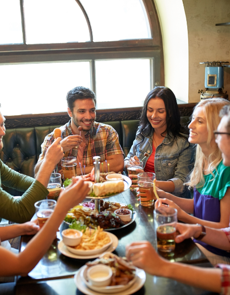Guide to the best CRM software for restaurants in the UK
On this page, you’ll learn about the most common functions and features of the most popular CRM solutions on the market and how they stack up against each other, as well as explore options for learning more about our Access CRM system, currently being used across thousands of sites in the UK.
Importance of customer relationship management
Did you know that on average, 70% of a restaurant’s database consists of customers who have only visited once?
Here at Access Hospitality, when we talk to our customers about the importance of customer relationship management, we look at what impact it would have on their business if just 10% of their database returned for just one extra visit a year. For a customer with a database of 100,000 contacts, and an average check size of £25, that could equal potential revenue of £250,000.*
With that in mind, CRM software can be the key to unlocking that revenue potential by building strong customer relationships through more targeted and effective marketing communications.
Key features of restaurant CRM software
The principal function of CRM software for restaurants is a guest database, where customer data is collected and stored. But most CRM software systems offer additional functions to help with the management of customer relationships.
Check out the following core functions of a restaurant CRM system and what they do:
1. Customer lists
The CRM database holds data about your customers, such as their name, email, phone number and date of birth, but it also enables you to segment this data into separate lists. Sorting customer data by demographic or location means you can better retarget your existing customers with appropriate messages and promotions.
2. Customer history
- Purchase data
- Preferences
- Demographic
A CRM system enables you to keep sales records from every visit a customer makes to your restaurant, including what they’ve ordered and what their preferences might be. These records have multiple benefits for the business. They not only provide an insight into popular dishes but the preference notes (e.g., whether they are vegetarian or their specific allergens) can be used to tailor marketing communications to help your customers feel like you can better serve their specific needs. Your vegetarian customers won’t want to hear about your upcoming Steak Night and similarly, your regular midweek lunchtime diners probably aren’t interested in the Saturday night cocktail offer. And worse still, misplaced communication can actively turn your customers off when it comes to dining with you.
3. Marketing campaigns
- SMS
- Social
- SCV
- Targeted
This is where CRM software for restaurants comes into its own. All that lovely customer data that has been collected and segmented can be used in marketing campaigns to draw customers back into your restaurant.
CRM software can help you harness your data and create a powerful single customer view that enables you to track and target your customers based on their spending habits and behaviour.
Some CRM systems like our hospitality CRM, Acteol also enable you to manage your social media accounts through the platform, so you can manage all marketing processes in one place, as well as integrate with third-party review and loyalty platforms so you can manage all customer communications.
The CRM system helps you build a full view of your customer’s interactions with you and deliver highly targeted marketing and automated campaigns. Automated marketing campaigns can help you retarget customers after a specified amount of time since their last visit to encourage them to return or help you run basic marketing campaigns, like sending out a happy birthday message on your customer’s birthday.
4. Reporting
- Open rate
- CTR
Once you’ve set up your marketing campaigns, you’ll need to know how successful they are. Most CRMs have reporting dashboards so you can track open and click-through rates for emails, monitor table bookings, or how many vouchers have been redeemed after a promotion. These metrics help you monitor the performance of marketing campaigns over time to ensure they are effective.
5. Integrations
- Loyalty
- Epos
- Reservations
- Guest feedback
- Gift cards/ e commerce
- Social
- Guest Wi-Fi
One thing you should consider when choosing restaurant CRM software is the ease of integration with other systems you already use. This might include your EPoS, reservation system, loyalty schemes, guest Wi-Fi, social channels and guest feedback and survey systems. Many popular CRM platforms are sold as part of a hardware or software package which means you must use the provider’s other systems as well as their CRM.
Integrations support the single customer view (SCV), where data is automatically brought together and updated following every customer interaction – from point of booking to ordering behaviour and feedback.
Key considerations when choosing restaurant CRM software
So, what do you need to know when choosing a CRM solution for your restaurant or hospitality business? CRM software is widely used across all business industries and there are plenty out there that serve multiple kinds of businesses. But we would always recommend a specialised hospitality-focused solution, mainly because as an industry that is supported by a lot of different technology systems, a hospitality-focused platform will be better equipped to support multiple integrations. As well as this, you will benefit from support from your tech provider that is specific to your industry.
With that in mind, let’s look at some of the key considerations when choosing a hospitality-focused CRM software for your business:
1. Cost
As with any product or service selected for your restaurant, the price of restaurant CRM software should be a key consideration when choosing the right one for your business. Pricing plans differ depending on the provider with some charging a monthly fee, while others charge yearly. There may also be set-up costs and additional or increased costs per campaign or number of contacts in your database.
The package price may increase if you decide to add bolt-on services and there may be additional cost for sending SMS marketing messages. Whatever the outlay may be, it is worth considering the potential return on investment.
Investment in restaurant CRM software could lead to a greater number of return visits and improved customer service, which could result in a higher spend per visit. According to research by Access, if 10% of your business returned for one extra visit per year, it could raise an extra £250k. Using such a system, which pulls data together and puts it in in one place could also save the business valuable time and reduce staff costs.
2. Features
We’ve already talked about some of the many different features you’ll come across when shopping for CRM software. As well as the basic data collection and storage functionality that comes with most CRM systems, your chosen solution might feature a whole host of additional features to help you segment and utilise your customer data, manage post-visit communications such as surveys and reviews and some snazzy tricks to up your marketing game.
Some of these features may come with an additional cost on top of the flat monthly fee you’ll usually pay and it’s worth considering how useful those impressive-sounding features will be to your business. Some features will only really benefit multi-site operations and chains and smaller enterprises might save money by choosing a specialist solution.
It’s also worth noting that choosing a system that is designed specifically for the hospitality industry is a good way to make sure you’re not paying for features that you’ll never need.
3. Integrations
Another thing you’ll want to think about when choosing a CRM system is how that will work with your existing tech solutions. Some restaurant management software solutions offer CRM functionality as part of their wider offering – which can sometimes limit your ability to customise your restaurant tech mix.
Other systems stand alone as a CRM solution – but support integrations with multiple leading solutions across EPoS, WIFi, reservations, loyalty software and guest feedback systems.
Find out how our hospitality CRM solution can help your restaurant do more with your data
What is the best CRM software for your restaurant?
It’s time to look at some of the leading CRM systems serving the restaurant and hospitality industry at the moment.
There are lots of great CRM systems available, some offer CRM and marketing functionality as part of a complete restaurant management solution or connected to an online booking software or EPoS. For our list, we’ve narrowed down some of the best standalone CRM systems – so in all cases, you’d want to look at how they integrate with your current restaurant tech.
Today we’re going to compare:
- Acteol SE
- Airship
- Mailchimp Premium
*Prices are correct as of November 2024.
Restaurant CRM feature comparison
Acteol SE
Acteol SE is our complete hospitality CRM platform for businesses with fewer than 15 sites, that enables restaurant operators to harness their customer data to make informed marketing decisions. Including the most extensive and advanced functions of all the platforms on this list, features such as interest category tagging, weather trigger and journey builder tools enable operators to create the most targeted and engaging campaigns.
For businesses with more than 15 sites, check out Access Enterprise which includes all modules features such as audience management, push notifications, social media management and survey and landing page builder.
Airship
Airship CRM offers a hospitality-tailored CRM solution with a wide range of email marketing functions such as A/B/C/D testing and automated email customer journeys. With a simple pricing model that allows users to get an idea of price based on their size directly from the website.
Mr Yum - Connect
Mr Yum’s Connect CRM offers an easy-to-use hospitality-focused platform with a flexible pricing model that allows you to choose one of three levels of functionality based on your business needs and the number of contacts.
Mailchimp Premium
Mailchimp is a familiar marketing platform across many industries that is known for its variety of packages that caters to different business sizes. For this comparison, we’ve used the Premium package that offers the closest functionality to the other marketing platforms in this list.
Best CRM software for big restaurant chains
Large restaurant chain operators will have massive amounts of customer data and need a CRM system that will help provide visibility and actionable insights across large volumes of customer data. Streamlining processes and automating marketing campaigns should be a huge priority for larger restaurant businesses.
Big businesses also use a lot of tech, so those system integrations should be an important factor, as well as management across the entire customer journey – from online discovery, booking, post-visit communications and building customer loyalty.
A CRM system that makes managing marketing communications easier should be the most important factor and those extra features that can increase engagement from your audiences will drive up the cost of your system.
Key features of CRM software for large restaurants and chains:
- Marketing automation
- Customer journey visibility
- Actionable data insights and reporting
- Tech integrations
- Audience management
- Survey, voucher and loyalty modules built in
Best CRM software for small restaurants
Independent and small restaurant operators will have different considerations and priorities – which is why can be good to choose a system catered for smaller businesses – this can also help bring down the cost by eliminating some of the additional features.
Smaller restaurant businesses may not have a specialist marketing team to handle customer communications, so an easy-to-use system is essential. It should also be considered how much support your provider will offer through both implementation and day-to-day to ensure you are making the most of the software.
Key features of CRM software for small restaurants:
- Ease of use
- Assistance through implementation
- Focus on CRM and campaign building over additional features
How can your restaurant benefit from CRM? Find out in our guide.
What next?
With everything we’ve discussed, it’s clear that the best CRM software for restaurants is tailor-made for the industry with robust data collection through integrations and the ability to segment that data for targeted marketing. Choosing a solution for your business requires some thought and depends on your specific circumstances.
Remember to think about:
- Budget
- Business size
- Business goals
- Usability
If you’re currently looking for a hospitality-focused CRM system for your business, you can learn more about both our Acteol SE (for less than 15 sites) and Acteol Enterprise (for more than 16 sites) solutions that help operators choose the best solution for them.
Talk to our CRM and marketing automation team about a CRM system for your restaurant today or read more about the best marketing tools to drive results to learn more about the benefits of different marketing tools for restaurants.
Find out more about how our hospitality CRM, Acteol can help drive customer spend
Related resources
Related resources to support you in marketing your restaurant and managing customer relationships









